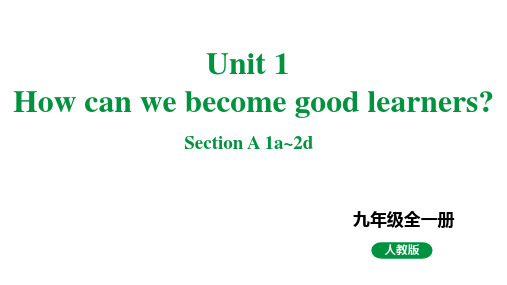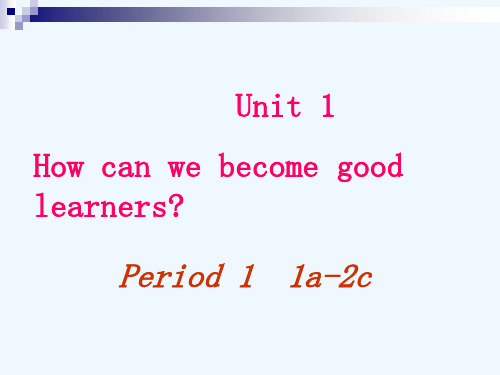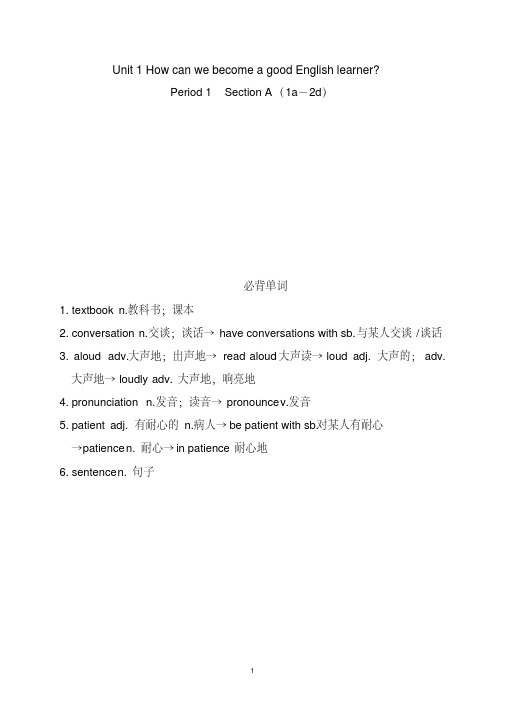人教新目标英语九年级全册 Unit 1 Section A (1a-2d) 复习训练题 含答案
人教版九年级英语上册unit 1 Section A(1a-2d)

5 ____ Have you ever studied with a group?
2b Listen again. Match each answer below with a question above.
d,b,c,a
2c Make conversations using the information in 2a and 2b A: Have you ever studied with a group? B: Yes, I have. I’ve learned a lot that way.
• 4) English is spoken by lots of people. • 5) My brother studies history by working with a group. 表示方式或手段,by + V-ing形式,在句中作方式状语,“通过…… 方式(方法)”或“借助……手段”
Unit 1 How can we become good learners?
Section A
TALK ABOUT HOW TO STUDY
Do you study English by the following ways?
by reading aloud.
by asking the teacher for help.
Summary How do you study English? 1. by working with friends 2. by watching English movies. 3. by making word cards. 4. by reading the textbook. 5. by listening to tapes. 6. by asking the teacher for help. 7. by reading aloud.
人教版英语九全Unit 1 Section A(1a-2d)课后作业及答案

Unit 1 How can we become good learnersSection A (1a—2d)根据汉语意思完成英语句子,每空一词。
1. 现在来做单词卡片怎么样?What about ________ ________ ________ now?2. 辛迪通过听磁带学习法语。
Cindy learns French by ________ ________ ________.3. 他说话声音低,太难听清楚他说什么了。
He speaks in a low voice. It’s ________ ________ ________ hear him clearly. 4. 我这样能提高我的口语技能吗?Can I improve my ________ ________ this way?5. 那位专家什么时候给我们作报告呀?When will the expert ________ ________ ________ ________?6. 如果你逐字读,你需要三天才能读完这本书。
If you read ________ ________ ________, you need three days to ________ ________ the book.7. 房间越干净,你就会感觉越舒服。
________ ________ the room is, ________ ________ ________ you’ll feel.8. 那里的条件比他想的还要差。
The conditions there were worse ________ ________ ________.根据对话内容,从方框中选择恰当的选项补全对话,其中有两项多余。
A: Engli sh is a difficult language to learn, isn’t it?B: Yes. (1)______A: True, but English is harder than most. It’s a crazy language.B: (2)______A: Because one letter can have several pronunciations.B: (3)______A: Sure. Listen to the o in hot, cold, love and to.B: Hmm. (4)______A: You see, there are at least four ways to pronounce o. And there’s another problem with English.B: (5)______A: One word can have several meanings. For example, the word catch. You say to catch a ball, to catch a cold, to catch a bus and to catch a mouse. They’re very different.B: You’re right. English is a crazy language.参考答案:1. making word cards2. listening to tapes3. too hard / difficult to4. speaking skills5. give us a report6. word by word; finish reading7. The cleaner; the more comfortable8. than he thought1-5 EGBFC。
人教版新目标九年级英语unit1 sectionA 1a-2d优秀教学设计

3.掌握下列句型:How do youstudy English? I learn by working with a group.
准
备
课件,教案,u study English?
Do you study English by the following ways?
课
题
Unit 1 How can we becomegood learners? Section A(1a-2d)
优化方案
目
标
1.熟练掌握下列词汇:aloud,pronunciation,discover,repeat,note
2.熟练掌握下列短语:work with friends,ask the teacher for help read aloud,look up,
T: How do you study English?
S: I study English_______
by working with friends./by making word cards.
by asking the teacher for help./by reading the textbook.
Step 5Pair work:1c Make conversations about howyou study for a test.
Step 6 Listening:2a Listen and check the questions you hear.
1 ____ Does anyone learn English by watching videos?
by working with a group./by listening tapes.
人教版英语九年级全一册-Unit 1 Section A 1a-2d(教案)

Unit 1 How can we become goodlearners?Section A 1a-2d一、教学目标1. 学生能熟练掌握下列词汇及短语:textbook, conversation, aloud, pronunciation, sentence, patient, improve, understand, work with friends, make word cards, ask the teacher for help, read aloud, practice pronunciation2. 掌握重点句型(1) —How do you study for a test?—I study by working with a group.(2) —Have you ever studied with a group?—Yes, I have. I’ve learned a lot that way.3. 能够掌握“动词+by+动词-ing”形式表方式、方法。
4. 能够听懂谈论学习方法的对话并能运用正确的表达方式编写对话。
5. 能够体会英语学习中的乐趣,成为积极主动的学习者。
二、教学重点及难点重点:1. 掌握本单元出现的词汇、短语及目标语言。
2. 学习并运用有关学习方式方法的语言表达。
难点:掌握“by+动词-ing形式”表达学习方式。
三、教学准备教师:教学课件;多媒体设备学生:课前预习四、教学过程Task 1Step 1 Warming-upFree talkT: What do you usually do when you study English?S1: …T: How do you learn English?S2: I learn English by doing…S3: …【设计意图】展开师生、学生之间的交流,为下面1a活动的学习做好准备。
Step 2 Pre-listening1. Look at the pictures. Talk about the questions and learn the new words.How does he learn English?How does she learn English?【设计意图】利用图片学习更多的学习方法,开阔学生的视野,有利于促成口语对话的开展。
英语人教新目标九年级全册Unit1 Section A 1a–2d PPT课件

3. __ What about listening to tapes? 4. __ What about reading aloud to practice pronunciation? 5. __ Have you ever studied with a group?
by speaking English with friends
How do you study English?
by reading English newspapers and magazines
1a Check (√ ) the ways you study English. Then add
an English club
They are talking about how to learn English / the best ways to learn English.
2a. Listen and check ( ) the questions you hear.
Questions 1. __ Does anyone learn English by watching videos?
A How to study for a test B Where to travel C How to make friends
1b Listen: How do these students study for a test?
Write letters from 1a above.
a. by working with friends.
He won’t like apples next year. Will he like apples next year? Yes , he will. No, he won’t.
人教新目标版九全英语 Unit1 SectionA 1a~2d 教学课件

Warming Up
Let’s first enjoy a video and then tell what the video is about.
Someone is teaching an English song.
It is a good way to learn English by singing
I study English by watching English DVDs.
1a.Check (√) the ways you study English. Then add other ways you
sometimes study.
___ a. by working with friends _b_y__k_e_e_p_in_g__a_n__E_n_g_l_is_h__d_ia_r_y______
___ e. by asking the teacher for help
ask sb. for help 向某人寻求帮助
Look at the picture in 1b. What do you think will talk about in the conversation?
While-listening
Unit 1 How can we become good learners?
Section A 1a~2d
九年级全一册
人教版
1 Learning Goals 2 Warming Up 3 Listening 4 Exercises 5 Summary
Learning Goals
通过本课的学习,学生能够: ①掌握与学习主题相关的单词和各种表达英语学习方法的短语,如:ask the teacher for help, make word cards, listen to tapes, have conversations with, practice pronunciation 掌握句型,如:How do you study/learn...? I study/learn by... ②能正确运用相关的语言表达,与同伴交流自己 在学习英语过程中遇到的问题并给出对应的方法。
九年级英语全册UnitPeriod1SectionA1a_2d新版人教新目标版

B: See you then.
A. At half past two.
B. What should I do?
C. Let’s make it tonight! D. What can I talk about?
E. Who will give the talk? F. Would you like to listen to it?
【点拨】根据第二句可知,提高英语需要时间,故判断 上一句意为“你应该有耐心”。careful 仔细的;patient 有耐心的;active 积极的;honest 诚实的。故选B。
返回
( B ) 13. — I always feel _____ when speaking in front of others.
返回
10. — It’s difficult for me __ the word in such a short time.
—Come on! I’m sure you can. 【点拨】It’s +adj. + for sb. + to do sth. 是固定句型。
返回
( B ) 15.—Learning a language is not easy. ______.
—I agree. Rome wasn’t built in a day.
A. It helps a lot
B. It takes time
C. That’s interesting D. That sounds too bad
令人激动的事情发生了。——你说得对。by 表示 “通
过……”,符合语境。故选A。
返回
( B ) 12. [2023安庆四中月考] You should be ________. Improving your English needs time. A. careful B. patient C. active D. honest
英语人教版九年级全册unit1 section A 1a-2c

pronunciation v.发音
1. How do you… for…? by +doing
---How do you study for a test? ---I study by making word cards.
I study by…
doing exercises doing some reciting going over the exercises
and notebooks
taking part in extra classes after school
get a tutoຫໍສະໝຸດ (家庭教师)joining an English club
Reading: reading aloud to practice pronunciation
reading English magazines and newspaper
Writing: keeping English diaries
doing lots of exercises
movies. 我通过看英文电影学英语。
How do they study for an English test?
She learns English by ______ to tapes.
They learn English by ____ the textbook aloud.
They learn English by ____ with friends.
Help me!
初中英语(新人教版)九年级全一册同步测试:Unit 1 Section A(1a-2d)【含答案】

Section A(1a-2d)知能演练提升一、根据句意及汉语或首字母提示完成单词1.I think it’s a good habit to read the (课本)in the morning.2.The (句子)is hard for me to understand. Will you please give me a hand?3.She speaks English with excellent p.4.I think reading a is very important in learning English.5.Read the three (谈话) between Lucy and Lily and answer the following questions.二、用括号内所给单词的适当形式填空1.The doctors go to see their (patient) every morning.2.My brother learns English by (work) with friends.3.I’m a slow (read). Can you give me some good advice?4.—What about (hang) out tonight?—That’s a good idea.三、按要求完成下列句子1.He often does the shopping at home by using the Internet. (就画线部分提问)he often the shopping at home?2.Could you tell me how I can learn English well? (改为简单句)Could you tell me English well?3.Why not read aloud to practice pronunciation? (改为同义句)reading aloud to practice pronunciation?4.She is too young to look after herself. (改为复合句)She is young she look after herself.★四、补全对话A:You look unhappy. 1.B:Bad luck! I didn’t pass the English exam again.A:2.But please don’t give up.B:Well, maybe I don’t have a good way of learning English.A:3.B:I learn it by doing my homework early in the morning.A:Oh, I think you should do your homework in the evening. You’d better read your textbook early in the morning because it’s easy for you to remember something at that time. Do you think so?B:Yes, I’ll do some reading instead.A:4.B:No, never! I just listen to my teacher.A:It’s not good for you. You should write down the important things that the teacher tells you. Then you can review it after class.B:OK. I’ll buy a notebook and do as you say.A:Good luck to you!知能演练·提升一、1.textbook2.sentence3.pronunciation4.aloud5.conversations二、1.patients2.working3.reader4.hanging三、1.How does; do2.how to learn3.What/How about4.so; that; can’t四、1.D2.E3.A4.B5.C。
人教版英语九年级全一册-Unit 1 Section A (1a~2d)课件

Warming-up Pre-listening While-listening Post-listening
Summary
Listen and fill
Some boys and girls are talking about the best ways to learn English in the English club. No one learns English by _w__at_c_h_in_g__v_id_e_o_s__ because it’s too hard to understand spoken English. A girl thinks keeping a diary in English helps. Another girl learns by _s_tu_d_y_i_n_g_w__it_h_a__g_ro_u_p__ a lot. And she also studies by _h_a_v_in_g__c_o_n_v_e_rs_a_ti_o_n_s_ with friends to improve her speaking skills. One of the boys thinks it helps to practice pronunciation by _r_ea_d_i_n_g_a_l_o_u_d_. They also thinks learns by _l_o_o_k_in_g__u_p_n_e_w__w__o_rd_s__ in a dictionary is a great idea.
Summary
Make a conversation
A: How do you study for a test? B: I study by working with a group. A: Do you think we study for tests? B: …
九年级英语全册Unit1Howcanwebecomegoodlearners基础知识梳理(新版)人教新目标版

九年级英语全册:Unit 1 How can we become good learners?第1课时Section A(1a2d)aloud adv.大声地;出声地pronunciation n.发音;读音。
其动词形式为pronouncepatient adj. 有耐心的。
n. 病人。
其反义词为impatient 【拓展】(1)aloud, loud和loudly都意为“大声地”,但用法有区别。
①aloud 强调能让人听得见。
常与动词read, call等连用。
如:Read aloud so that we can all hear you. 大点声读,以便我们大家都能听见你。
②loud 强调声音响亮。
常与动词speak, talk, say, laugh等连用。
常用比较级形式。
如:Facts speak louder than words. 事实胜于雄辩。
③loudly 有时可与loud通用,但含有“喧闹”或者“嘈杂”的意味。
如:Don't talk so loudly. 别这么高声说话。
(2)patient的常用短语: be patient with sb. 对某人有耐心; be patient to do sth. 有耐心做某事; be patient of…能忍受/容忍……have conversations with 和……交谈finish doing sth. 完成做某事give a report 做报告word by word 逐字/词地☆It's too hard to understand spoken English.理解英语口语太难了。
“It is+adj.+to do sth.”结构,it在句中作形式主语,真正的主语是动词不定式的内容。
如:He speaks in a low voice. It's too hard to hear him clearly. 他说话声音很低,太难听清楚他说什么了。
英语人教新目标九年级全一册九年级英语上Unit 1 Section A (1a-2d)

How do they study English?
They study English by working with friends.
ey study English by practicing with foreigners.
Yes, it helps to improve my writing skills and know a lot about America.
Do you have conversations with friends in English?
Of course, we can talk about plenty of things like school, pets, movies, and our parents.
ideas at first. Don’t read word by word. Read word groups.
Jack: But I don’t understand many of the
words. I have to use a dictionary.
Annie: Try to guess a word’s meaning by
reading the sentences before and after
it. You probably understand more than
you think.
n. 句子
Jack: That sounds difficult! adj. 耐心的;n. 病人
Annie: Well, be patient. It takes time. You can
2020年人教版新目标英语九年级上册单元词句总结(全册)

Unit 1 How can we become a good English learner?Period 1 Section A(1a-2d)必背单词1. textbook n.教科书;课本2. conversation n.交谈;谈话→have conversations with sb. 与某人交谈/谈话3. aloud adv.大声地;出声地→read aloud大声读→loud adj.大声的;adv.大声地→loudly adv. 大声地,响亮地4. pronunciation n.发音;读音→pronounce v.发音5. patient adj. 有耐心的n.病人→be patient with sb.对某人有耐心→patience n. 耐心→in patience 耐心地6. sentence n. 句子必背短语7. ask...for...请求……给予……8. study for a test 备考9. give a report作报告10. word by word 逐字11. more than多于……必背句子12. It’s too hard to understand spoken English.听懂英语口语很难。
13. It takes time.这需要时间。
14. The more you read,the faster you'll be.你读得越多,你将会越快。
Period 2 Section A(3a-3b)必背单词1. expression n.表情;表示;表达方式→express v.表达;表露2. discover v. 发现;发觉→discovery n.发现3. secret n.秘密;秘诀→keep a secret保守秘密→the secret to/of success成功的秘密→secret a dj.秘密的;保密的→secret news 秘闻4. grammar n.语法必背短语5. be afraid to do sth.不敢做某事→be afraid of doing sth.害怕做某事6. fall in love with 爱上……7. look up (在词典或参考书中)查阅;抬头看→look it /them up在词典中查阅它/它们→look up to sb.仰慕某人=admire sb.8. because of因为必背句子9. The teacher spoke so quickly that I did not understand her most of the tim 老师说得太快,以至于很多时候我都听不懂她说的话。
Unit1SectionA(1a2d)课件人教版英语九年级全一册

续表
Period 1 Section A(1a-2d)
重难点梳理
1.—How do you study for a test? —I study by working with a group.(P1,1c) ——你怎样准备考试的? ——我通过小组学习的方式来备考。
知识探究 by doing sth.此短语中by是_介___词,意思为“__通__过__做__…__…__”等,其
Jack and his friend Annie are discussing English reading. Jack has
to finish reading a book and 1 .a report next Monday. And he
tells her that he's a 2 .reader. But Annie doesn't think it's so
Period 1 Section A(1a-2d)
重难点梳理
即学即练 他太小而不能上学。 He is _t_o_o_ young _t_o_ go to school. He is __so__ young __th_a_t_ he can't go to school. He isn't _o_l_d__e_n_o_u_g_h_ to go to school. 4.The more you read,the faster you'll be.(P2,2d) 你读书越多,你 阅读的速度就会越快。 知识探究 the+比较级,the+比较级,意思为“__越__…__…__越__…__…__”。而 “比较级 +and+比较级”, 意思为“__越__来__越__…__…__”。
初中英语九年级 Unit 1 第1课时 Section A (1a-2d) (说课稿)

初中英语九年级 Unit 1 第1课时 Section A (1a-2d) (说课稿)一. 教材分析本文选自人教版初中英语九年级Unit 1 第1课时 Section A (1a-2d),本节课的主要内容是介绍一般过去时。
通过本节课的学习,学生能够掌握一般过去时的构成和用法,以及如何运用一般过去时描述过去发生的事情。
教材内容贴近学生的生活,激发学生的学习兴趣,培养学生的语言运用能力。
二. 学情分析九年级的学生已经具备了一定的英语基础,对学习英语有较高的兴趣。
但部分学生对一般过去时的概念和用法还不够清晰,需要在本节课中进行重点讲解和练习。
此外,学生的语言表达能力和团队合作能力还有待提高,教师需在教学过程中注重培养。
三. 说教学目标1.知识目标:学生能够掌握一般过去时的构成和用法,理解一般过去时与现在时态的区别。
2.能力目标:学生能够在实际情境中运用一般过去时描述过去发生的事情,提高语言运用能力。
3.情感目标:通过本节课的学习,学生能够培养团队合作意识,激发对英语学习的兴趣。
四. 说教学重难点1.教学重点:一般过去时的构成和用法,以及如何运用一般过去时描述过去发生的事情。
2.教学难点:一般过去时与现在时态的区别,以及在实际情境中灵活运用一般过去时。
五. 说教学方法与手段1.教学方法:采用任务型教学法,让学生在实际操作中掌握一般过去时的用法。
2.教学手段:利用多媒体课件、图片、卡片等辅助教学,提高学生的学习兴趣和参与度。
六. 说教学过程1.导入:通过展示一组图片,引导学生谈论过去的事情,激发学生对一般过去时的兴趣。
2.新课导入:讲解一般过去时的概念和构成,让学生理解一般过去时与现在时态的区别。
3.实例讲解:通过具体例句,讲解一般过去时的用法,让学生在实际情境中感知一般过去时。
4.小组讨论:学生分组讨论,运用一般过去时描述过去发生的事情,培养团队合作能力。
5.课堂练习:设计一些练习题,让学生巩固所学内容,及时发现并纠正错误。
英语人教版九年级全册unit1 SA 1a-2d

(用 too---to转换同义句) 2. The box is too heavy for me to carry.
(用 so---that--转换同义句)
21. Well, be patient. adj. “有耐心的”,作定语或表语。 e.g. Dave is a patient person. You’ll just have to be patient. be patient with sb. “对某人有耐心”。 e.g. She’s very patient with young children. n. “病人” e.g. Several patients are waiting to see the doctor.
22. The more you read, the faster you’ll be. “the+比较级+ ..., the +比较级+ ...”表示 “越……,就越……”。 e.g. The warmer the weather is, the better I will feel.
【运用】根据汉语意思完成英语句子。 你练习得越多,就写得越好。
【结论】
1. by可表示位置,(1) “在___…__…___旁__”边,如句1。也有“从……旁边
(经过)”之意。 2. by可表示交通、传递等的方式,如句2。 3. by可表示时间,“到(某时)之前; 不迟于”,如句3。
4. by可用于构成(2)被___动__语___态,“被, 由”,如句4。 5. by可表示方式或手段,(3)b“_y_+_v_._-_i_n_g__形__式”结构在句中作方式状
英语人教新目标九年级全一册Unit 1 Section A (1a-2d)改

4. _c_ What about reading aloud to practice
pronunciation?
5. _a_ Have you ever studied with a group?
注意:never, ever一般置于助动词have/has 之后,过去分词之前。
现在完成时与一般过去时都和过去发 生的事情有关,但是现在完成时强调这 一动作与现在的关系,如对现在产生的 结果、影响等,而一般过去时只表示过 去的事实,不表示和现在的关系。
e.g. I have just been to London. I went there last month. 我刚去过伦敦,是上个月去的。 I have been to the science museum many times. I went there on our last summer vacation. 我已经去了科学博物馆很多次。 去年暑假我还去了呢。
Jack: Annie, I’m a little nervous. I have to finish reading a book and give a report next Monday.
Annie: That doesn’t sound too bad. Jack: But I’m a very slow reader. Annie: Just read quickly to get the main ideas.
by + v.-ing
常常表示手段、方式或方法,可以用来回答how引导的特殊疑问句。
- 1、下载文档前请自行甄别文档内容的完整性,平台不提供额外的编辑、内容补充、找答案等附加服务。
- 2、"仅部分预览"的文档,不可在线预览部分如存在完整性等问题,可反馈申请退款(可完整预览的文档不适用该条件!)。
- 3、如文档侵犯您的权益,请联系客服反馈,我们会尽快为您处理(人工客服工作时间:9:00-18:30)。
Unit 1 Section A (1a-2d) 复习训练题一、单词短语默写
1.课本____________
2. 交谈____________
3.大声地____________
4. 发音(n.)____________
5.句子____________
6.制作单词卡片_________________
7.和朋友一起学习___________________
8.向老师请教___________________
9.听磁带____________________
10.口语技能_________________
11.逐词地__________________
12.耐心点儿___________________
二、用括号里所给词汇的适当形式填空
1. He studies English by _______ (make) vocabulary lists.
2. What about _______ (watch) English-language movies to improve your English?
3. I'm a little _______ (tired). Let's take a short rest.
4. Over the years he has become _________ (patient) than me.
三、单项选择
1. ________ do you study for a test?
A.What B.How C.When D.Where
2. He learns English by ________ English songs.
A.listen B.listen to C.listening D.listening to
3. How do you study ________ an examination?
A.to B.at C.with D.for
4. Do you often have meals ________ your parents?
A.with B.for C.to D.at
5. — How do you study for a test?
—I study by ________.
A.ask the teacher for help B.asking the teacher for help
C.ask the teacher to help D.asking the teacher to help
6. — How do you study English so well?
—________ reading lots of books.
A.To B.Of C.At D.By
7. Reading aloud can improve my ________ skills so that everyone can understand my ________ English.
A.speaking;speaking B.spoken;spoken
C.speaking;spoken D.spoken;speaking
四、翻译句子
1. 去看场电影如何?
2. 我认为大量阅读是必要的。
3. 你那样做一定失败。
4. 现在,不要逐字读报告,大致地看一下就可以了。
5. 我认为我是一个相当有耐心的人。
6. 你练习得越多,理解得就越好。
参考答案:
一、
1. textbook
2. conversation
3. aloud
4. pronunciation
宋以后,京师所设小学馆和武学堂中的教师称谓皆称之为“教谕”。
至元明清之县学一律循之不变。
明朝入选翰林院的进士之师称“教习”。
到清末,学堂兴起,各科教师仍沿用“教习”一称。
其实“教谕”在明清时还有学官一意,即主管县一级的教育生员。
而相应府和州掌管教育生员者则谓“教授”和“学正”。
“教授”“学正”和“教谕”的副手一律称“训导”。
于民间,特别是汉代以后,对于在“校”或“学”中传授经学者也称为“经师”。
在一些特定的讲学场合,比如书院、皇室,也称教师为“院长、西席、讲席”等。
5. sentence
6. make word cards
7. work with friends
8. ask the teacher for help
9. listen to tapes
10. speaking skills
11. word by word
12. be patient
二、
1. making
2. watching
3. tired
4. more patient
三、
BDDAB DC
四、
课本、报刊杂志中的成语、名言警句等俯首皆是,但学生写作文运用到文章中的甚少,即使运用也很难做到恰如其分。
为什么?还是没有彻底“记死”的缘故。
要解决这个问题,方法很简单,每天花3-5分钟左右的时间记一条成语、一则名言警句即可。
可以写在后黑板的“积累专栏”上每日一换,可以在每天课前的3分钟让学生轮流讲解,也可让学生个人搜集,每天往笔记本上抄写,教师定期检查等等。
这样,一年就可记300多条成语、300多则名言警句,日积月累,终究会成为一笔不小的财富。
这些成语典故“贮藏”在学生脑中,自然会出口成章,写作时便会随心所欲地“提取”出来,使文章增色添辉。
1. What about going to a movie?
2. I think it's necessary for us to read a lot.
3. You're sure to fail if you do it that way.
4. Don't read the report word by word now;just skim it.
“教书先生”恐怕是市井百姓最为熟悉的一种称呼,从最初的门馆、私塾到晚清的学堂,“教书先生”那一行当怎么说也算是让国人景仰甚或敬畏的一种社会职业。
只是更早的“先生”概念并非源于教书,最初出现的“先生”一词也并非有传授知识那般的含义。
《孟子》中的“先生何为出此言也?”;《论语》中的“有酒食,先生馔”;《国策》中的“先生坐,何至于此?”等等,均指“先生”
为父兄或有学问、有德行的长辈。
其实《国策》中本身就有“先生长者,有德之称”的说法。
可见“先生”之原意非真正的“教师”之意,倒是与当今“先生”的称呼更接近。
看来,“先生”之本源含义在于礼貌和尊称,并非具学问者的专称。
称“老师”为“先生”的记载,首见于《礼记?曲礼》,有“从于先生,不越礼而与人言”,其中之“先生”意为“年长、资深之传授知识者”,与教师、老师之意基本一致。
5. I think I am quite a patient person.
要练说,得练看。
看与说是统一的,看不准就难以说得好。
练看,就是训练幼儿的观察能力,扩大幼儿的认知范围,让幼儿在观察事物、观察生活、观察自然的活动中,积累词汇、理解词义、发展语言。
在运用观察法组织活动时,我着眼观察于观察对象的选择,着力于观察过程的指导,着重于幼儿观察能力和语言表达能力的提高。
6. The more you practise,the better you can understand.。
